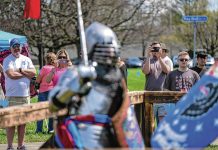There is no better way to prove you have learned something well than by teaching someone else.
Those are the words of Bartholomew County historian Dr. Tamara Stone Iorio about the success of “Spring on the Farm.”
The two-day event, which attracts nearly 500 middle and grade school students from across the region, is sponsored by the Bartholomew County Historical Society (BCHS) at the Henry Breeding Farm facility near Edinburgh.
“Spring on the Farm” is described by historical society Executive Director Diane Robbins as “a well-conceived multi-generational learning experience.”
[sc:text-divider text-divider-title=”Story continues below gallery” ]
It begins by selecting adult mentors who have mastered different skills or crafts utilized during the 19th or early 20th centuries in Indiana, according to historical society educator and Programs Manager Adam Rediker.
Recruited from throughout the south central Indiana region, these adult mentors agree to spend at least one day a week for a minimum of a month teaching eighth graders the basics of their skill or craft, Robbins said.
During “Spring On the Farm,” the eighth-graders stage demonstrations at 17 different stations for elementary school students, Rediker said.
“They become the teacher, but by demonstrating to the younger children over and over again, the eighth graders are better able to start mastering their skills,” he said.
While the grade-school students enjoy hands-on demonstrations and old-fashioned games, the adult mentors say they are also enjoying the opportunity to share skills or hobbies that they learned long ago while they were growing up, Robbins said.
The participating students come from public and private schools in Decatur and Monroe counties, as well as Bartholomew, Rediker said.
After conducting a pottery demonstration, Hauser Jr.-Sr. High student Cameron Toole said he had not worked with an actual pottery wheel until a month ago. As a result, the 13-year-old admits he was struggling during his first demonstration.
“But I just kept getting better and better each time,” Toole said. “I hope to be an artist, and pottery allows me to do something artistically different, as well as have fun and be creative.”
For the younger boys, one of the most popular stations featured two steam engines both built in Columbus. One is a 25-horsepower Reeves steam engine built in 1918, while the other is a 16-horsepower Reeves steam engine built in 1906, according to volunteer mentor Christopher Huber.
Meanwhile, many of the girls gravitated toward the small animals in the lower section of the Breeding Farm’s two-level barn.
The younger children were allowed to pet bunnies, feed chickens, hold baby chicks, get close to a goat, and play with a baby pig, according to Hauser eighth-grade presenter Brooklyn Saxe.
“We gave facts on posters as we let them play with the animals,” Saxe said. “But being in the animal barn also teaches us responsibility because we have to watch the young kids closely to make sure they are safe.”
Every year, students seem amazed when they learn how many tools were made by hand in Indiana 200 years ago, Iorio said.
“When they learn the amount of time that had to be spent making each individual tool before they could manufacture something else, it’s a powerful example of how far our lives have progressed,” the county historian said.
While some pioneer games just provide old-fashioned fun, there was a lesson when six kids, along with a few adults, held on to ropes to pull a carriage down and up a slight decline.
“Imagine how long a mule or horse had to do that when they are working in the field, or pulling a wagon through rivers with strong currents,” said Lydia Whiteside, 9, who attends St. Peter’s Lutheran School. “It takes a lot of strength to pull that wagon.”
And after spending one hour of constantly churning butter, Hauser student Hailei Knight said her arm was worn out. However, churning ice cream only takes about half that amount of time, according to an informational poster.
Patience was needed by pioneer families when candles were being made from animal fat during the winter, adult mentor Bertie Oyler, of Columbus, said. A number of the grade school kids lost their patience after dipping their candle in wax about 40 times, Oyler said. But it takes about 90 dips to make a practical candle, she said. Pioneer women usually took an entire week to make between 200 to 300 candles, Oyler said.
But for those wanting to make music, any beginner can make beautiful chords almost immediately with an autoharp, Hope resident and mentor Arnold Ellison said.
“You just push a button and strum across the strings, and you get pretty sounds,” Ellison said.
At the end of a long line of stations, students found the Natural History exhibit. With bones, skulls and pelts, the exhibit represented Indiana’s ecosystem in the early 19th century when the first settlers arrived, adult mentor Chuck Baker of Hope said.
“While some of the animals became extinct with time, others, such as deer, have been successfully reintroduced,’ Baker said.
While adults and students all have their favorite activities during “Spring on the Farm,” Rediker said it was the lack of digital technology that makes the event special for him.
“When you hear kids say they had more fun working on the steam engines or sawing wood than playing video games, you know you are making an positive impact on their lives,” Rediker said.
[sc:pullout-title pullout-title=”About the Henry Breeding Farm” ][sc:pullout-text-begin]
The Henry and Blanche Breeding Farm, 13730 N. County Road 100W, Edinburgh, is an 1870 Federal-style brick house.
Three generations of the Breeding family lived in the stately two-story house until February of 1982, when Henry Breeding – a member of the historical society for many years – died and left the house and part of his property to the Bartholomew County Historical Society.
Today, the society holds a number of activities at the farm, as well as rents out the facility for private occasions.
Information: 812-372-3541 or visit bartholomewhistory.org
[sc:pullout-text-end]




